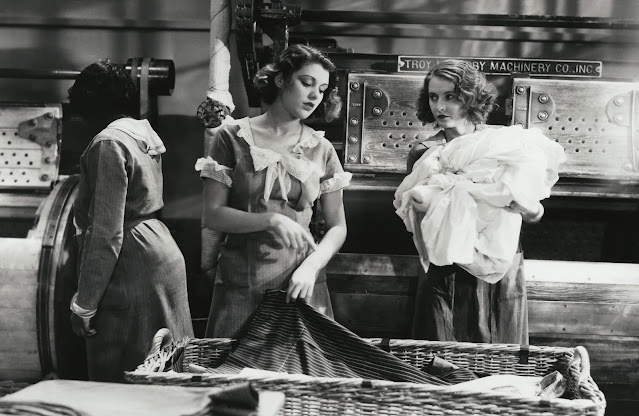Ladies They Talk About (1933) is one of the original women-in-prison films and is perfectly suited for the Pre-Code era. Directed by Howard Bretherton and William Keighley for Warner Bros., Barbara Stanwyck stars as Nan Taylor, a glamorous gun moll and a member of a bank robbing gang led by Don (Lyle Talbot) and Lefty (Harold Huber). Nan is a career criminal and has her job down pat. She's just needs to distract the cops and the people in charge while her cohorts do the dirty work. But one day her plan doesn't quite work out and she ends up in the clink. The comes her knight-in-shining-armor David Slade (Preston Foster). He's a hymn shouting reformer who broadcasts his religious sermons over the radio and hosts popular revivals in the city. He's got significant influence on the public and on local politicians and he takes a particular interest in Nan. It doesn't hurt that he's attracted to her too. Nan isn't quite sure about him and while he tries to save her from a conviction she winds up in San Quentin (when they used to house both male and female prisoners) anyways.
Now Nan needs to navigate the social politics of a women's prison. She quickly befriends the spunky and no-nonsense Linda (Lillian Roth) who becomes her sidekick. Linda introduces Nan to a motley crew of characters. There's Aunt Maggie (Maude Eburne), a former madame and an important ally for Nan. Mustard (Madame Sul-Te-Wan) who gets into quite the battle of social dominance with a seemingly high-and-mighty prisoner. Keeping watch over the crew is Noonan (Ruth Donnelly) a hard-nose but sympathetic prison matron who always has a cockatoo on her shoulder. Nan makes an enemy in Susie (Dorothy Burgess), one of David Slade's devoted followers who seethes with jealousy at Nan's romantic connection with him. Nan soon needs to decide whether she's going to give this David Slade guy a chance or risk it all by continuing her life of crime.
You really can't go wrong with a Pre-Code prison movie. There are so many good ones of the era including 20,000 Years in Sing Sing (1932), Paid (1930) and my personal favorite The Big House (1930) (which I reviewed here). Ladies They Talk About is thoroughly enjoyable despite a rather weak romantic storyline. The main draw really is the women-in-prison sequences. There's a reason this subgenre became popular during the exploitation era. It's titillating! Ladies They Talk About really has fun with the women's prison. Barbara Stanwyck's cell is decked out with fancy pillows, dolls, flowers, a dresser and even a gramophone to play records. The prisoners smoke cigarettes, do their hair and makeup and wear lingerie. One of them even gets to keep a pet dog. The film offers some outrageous fun with a crime drama and opposites-attract love story serving as just window dressing. How many other films boast Lillian Roth singing a love song to a picture of Joe E. Brown?!
Revisiting Ladies They Talk About sent me down the research rabbit hole about radio evangelism of the 1920s/1930s. While most people forget Preston Foster is even in this movie, I took special note of his character on this viewing. They tone down the religious elements—most likely to not offend any denominational groups—but it's clear that Foster's character represents the era when these figures influenced public morality through radio broadcasts and in-person revivals. This subject matter comes into play more prominently in another Barbara Stanwyck Pre-Code movie The Miracle Woman (1931) in which she plays an Aimee Semple McPherson type.
Ladies They Talk About was based on the play Women in Prison by Dorothy Mackaye who based the story on her own time locked up in San Quentin. In the late 1920s, Mackaye was a stage actress married to song-and-dance performer Ray Raymond and embroiled in a passionate affair with another actor Paul Kelly. On April 26th, 1927, a drunk Raymond and an equally drunk Kelly got into a fight at Raymond and Mackaye's apartment. Kelly beat Raymond so brutally that when Raytmond went to bed that night he fell asleep and never woke up. Mackaye tried to clean up the mess her lover made by bribing the coroner to change her husband's autopsy report finding from blunt force trauma to natural causes. Her scheme backfired. Both Kelly and Mackaye went to trial, were convicted and subsequently sent to San Quentin. Mackaye and Kelly reunited and married once Kelly served his time. She wrote about her experience in a play and Kelly was able to continue his acting career. I haven't gotten my hands on the original play yet but I'd be curious to see how much of her own story was in the play and what was changed for the movie adaptation.
Ladies They Talk About (1933) is available on Blu-ray from the Warner Archive Collection. It’s also available on DVD in volume #5 of the Forbidden Hollywood series.
The Blu-ray is from a 1080p HD Master from 4K scan of the original nitrate camera negative. Bonus features include English language subtitles, a theatrical trailer and the Warner cartoon Merrie Melodies: I Like Mountain Music.
Thank you to the Warner Archive Collection for sending me Ladies They Talk About for review!
I share more thoughts about the film and the Blu-ray on episode #6 of The Classic Movie Roundup on YouTube. Watch here:





















































